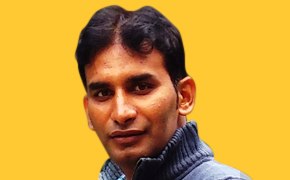Fahad Shafiq: My Next Great Impossible

Having recently completed his Ph.D., Dr. Fahad Shafiq is on a mission to boost crop productivity and feed our growing global population – here he tells us about his inspiration.
My work is concerned with fullerene derivatives and their biological role in alleviating salt stress in wheat to boost crop productivity in stressful environments.
If we enable plants to counter or even survive subcellular biochemical disturbances including oxidative stress, we can reduce productivity losses and even recover them. My work with polyhydroxy fullerenes has a strong potential to mitigate oxidative stress within cells. I hope we can increase crop resilience using this carbon nanomaterial.
“My inspiration is in how we [can]…make our crops tolerant to stresses…”
Crop productivity is a core issue for humans, especially in the context of changing climate and an increasing population. In Pakistan, a significant portion of the country has low precipitation. This makes crops vulnerable to different abiotic stresses, particularly salinity and drought, which are serious challenges to primary productivity. My inspiration is in how we cope with this problem to make our crops tolerant to stresses and feed the population.
“If you enjoy doing your work, it makes you persistent…”
I was lucky to have motivating teachers who sparked my interest. Dr. Muhammad Iqbal inspired me a lot with his problem-solving attitude – his feedback greatly influenced my work and I recently completed my Ph.D. in November 2019.
If you enjoy doing your work, it makes you persistent as well. It’s okay to feel lost or fed up sometimes but the next day, make a new start and keep going with a positive attitude.
FAQ
Q: What kind of mindset do you need to achieve the Next Great Impossible?
A: Persistence, patience, and hard work. Science is itself inspiring as long as you are doing quality research that contributes to society.
To continue reading please sign in or create an account.
Don't Have An Account?